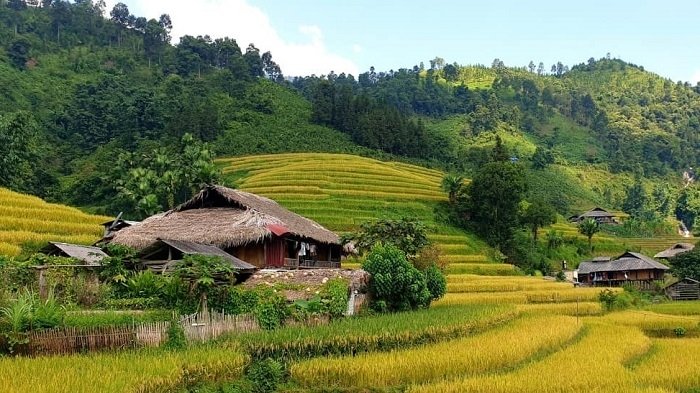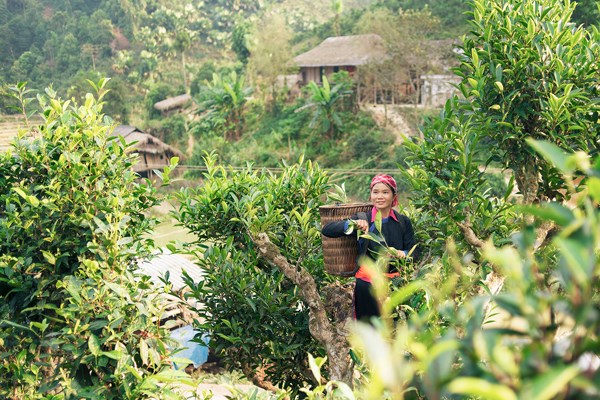
A corner of Ban Lien Commune (Photo: laocaitourism.vn)
Family of Vang Thi Can, the owner of Ban Lien Forest Homestay, is one of five households in Ban Lien participating in developing the community-based tourism model.
Visitors to the homestay can stay in a traditional stilt houses with palm leaf roof – the typical house of Tay ethnic people.
Can said that, since joining the project, her family has offered visitors with an opportunity to explore the traditional customs, daily lives, and festivals of the Tay ethnic group. The tourists can also join locals to try their hands at harvesting rice, picking tea leaves, and making cassava cakes.
“Despite facing many difficulties due to the COVID-19 epidemic, my family and I consider tourism as a means to earn long-term livelihood,” she said.
Can’s neighbour, Lam A Luan, also renovated his house and turned it to Che (Tea) Hill Homestay – a facility which can serve up to 20 visitors.
A Luan’s family has a 60-year old tea hill which covers more than 10 hectares behind the house, making his homestay have huge advantage in developing tourism while farming organic tea.
Visitors to Che Hill Homestay can not only take part in tours to local tourist sites and waterfalls but may also try picking and drying tea leaves for brewing tea.

Ban Lien has picturesque natural scenery, with palm forests, tea hills, and stilt houses leaning against the mountains or terraced fields. (Photo: tuoitrethudo.com.vn)
The families of Vang Thi Can and Lam A Luan are two of the five households participating in the project on increasing incomes and the role of ethnic minority women through the development of community-based tourism in Bac Ha District, Lao Cai Province.
The project is part of the Australian Government-funded programme on Gender Responsive Equitable Agriculture and Tourism (GREAT), which is being implemented in the provinces of Lao Cai and Son La.
Under the projects, participants were provided loan, receive training in communication skills on social networks, learning foreign languages from experts of Centre for Rural Economy (CRED), in order to equip themselves with necessary knowledge and skills in the hospitality and tourism industry.
As a result, the project participants now can develop contents to advertise their homestays on websites and social networks including Facebook and Zalo. They also renovated and redecorated their homes to give them have a more beautiful and environmentally friendly appearance while exerting efforts to preserve and promote the treasured traditional cultural values of their ethnic group.
Thai Thi Huyen Nga, the project’s officer, said that the GREAT programme was launched in March 2019 with three main goals: generating jobs and increasing incomes for locals, particularly women, through the development of community-based tourism; enhancing the confidence of ethnic minority women in doing business; and encouraging men’s support for women to participate in doing business, play a decisive role in the family, and take part in community activities.
In addition to bringing about obvious changes in enhancing women’s role and equality, the project has contributed to helping the participants to starting career in tourism in a professional way and encouraging them to pay greater attention to preserving traditional cultural values.
“We believe that tourism development in Ban Lien Commune will generate sustainable livelihoods for the people, thus driving economic growth in the locality,” Nga said.